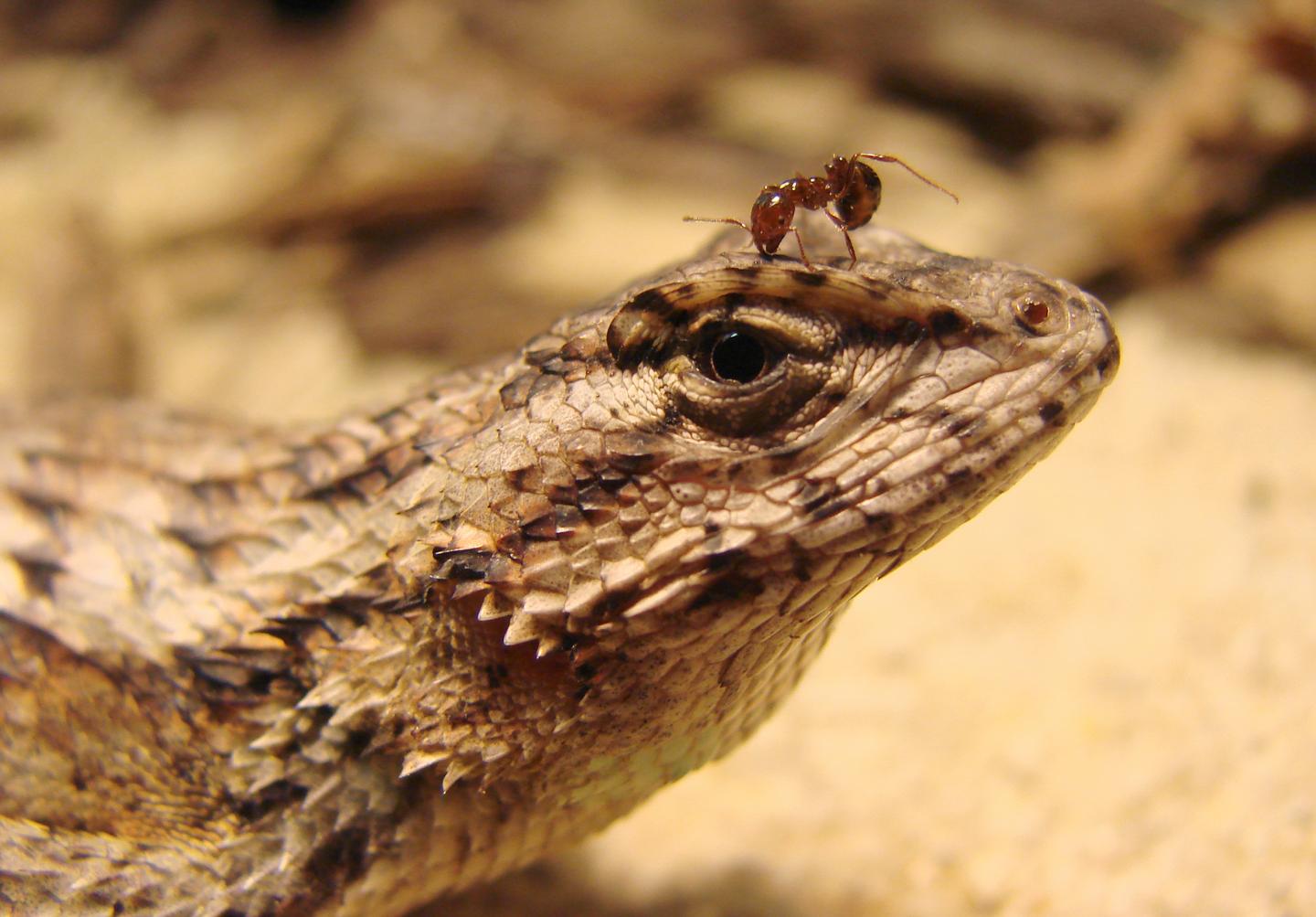
Credit: Langkilde Lab, Penn State
UNIVERSITY PARK, Pa. — Having ancestors who were frequently exposed to stressors can improve one’s own immune response to stressors, according to Penn State researchers. The results suggest that family history should be considered to predict or understand the health implications of stress.
“Prolonged stress typically suppresses immune function within an individual,” said Tracy Langkilde, professor and head of biology at Penn State. “For example, we often think of ourselves as more likely to get a cold when we’re stressed. We found that lizards whose ancestors lived in low-stress environments experienced suppressed immune function when we exposed them to prolonged stress, just as you might expect. But for lizards whose ancestors lived in high-stress environments, those animals had more robust immune systems when they were exposed to stress. So the immune response to stress actually is dependent upon the environment experienced by previous generations.”
According to Langkilde, the team conducted its work on fence lizards (Sceloporus undulatus), but believes the results may be similar in other animals, perhaps even in humans. Of course, various animals are subjected to different kinds of stressors. In these lizards, she said, stress is often the result of attacks by fire ants (Solenopsis invicta), an invasive species that occurs in the southeastern United States and is spreading northward and westward.
“Fire ants can sting and envenomate lizards, which is stressful and potentially fatal for lizards,” added Gail McCormick, a graduate student in Langkilde’s lab at the time of the research. “These attacks break lizards’ skin, leaving them vulnerable to infection, so it’s probably a bad idea to suppress immune function in response to stress when the predominate stressor, the fire ants, already induce an immune response through wounding. It turns out that lizards whose ancestors are from areas with fire ants have an improved immune response to stress, which may help to ensure their survival.”
To investigate the immune consequences of stress on animals with different heritages, the team captured pregnant females from the wild from two different kinds of environments — one that had been invaded by fire ants 60-to-70 years prior, or the equivalent of 30-to-40 lizard generations, and one that had not yet been invaded by fire ants.
The researchers raised the offspring of the captured females in high- and low-stress environments until they were adults. They created high-stress conditions by either exposing the lizards to fire ants or by dosing them every week with the stress-relevant hormone corticosterone dissolved in oil.
“This concoction soaks into lizards’ skin like lotion, causing a spike in their blood corticosterone levels that mimics their physiological reaction to being chased or attacked by fire ants,” said Langkilde.
Once the lizards reached adulthood — approximately 1 year old — the scientists assessed the animals’ immune function by measuring the ability of their blood plasma to hold a foreign protein in suspension.
“We found that offspring of lizards from high-stress environments had suppressed immune function while offspring of lizards from low-stress environments had enhanced immune function when they were exposed to stress relevant hormones during their own lifetime,” said McCormick. “This change is likely adaptive, as an enhanced immune response in the face of stress should also enhance survival in the presence of frequent attack by fire ants.”
A paper describing these results appears online as an accepted manuscript Jan 18 in the Journal of Experimental Biology.
“This work poses several interesting questions,” said Langkilde. “In a stressful situation, animals often divert energy towards critical functions, like escaping a predator, and away from less immediately critical functions, like immune function, growth or reproduction. This is beneficial in the short term, but can be costly if stress is prolonged. If lizards from sites invaded by fire ants are not suffering from a compromised immune system, what are they trading off? Do they suffer lower growth or suppressed reproduction, instead, when exposed to high-stress environments? These are some of the questions we plan to investigate.”
McCormick noted that understanding how species respond to stress can help in their management.
“In this changing world, animals may experience stressful situations more often, in some cases due to new kinds of stressors such as interactions with humans or invasive species,” she said. “It’s imperative that we understand how species respond to stress, and if this response varies across populations, in order to better allocate resources to mitigate any negative effects.”
###
Other authors on the paper include Travis Robbins, postdoctoral researcher at Penn State at the time of the research and currently an instructor of biology at the University of Nebraska, Omaha, and Sonia Cavigelli, associate professor of biobehavioral health at Penn State. This research was supported by the National Science Foundation.
[ Sara LaJeunesse ]
Media Contact
Gail McCormick
[email protected]
814-863-0901
Original Source
http://science.
Related Journal Article
http://dx.




